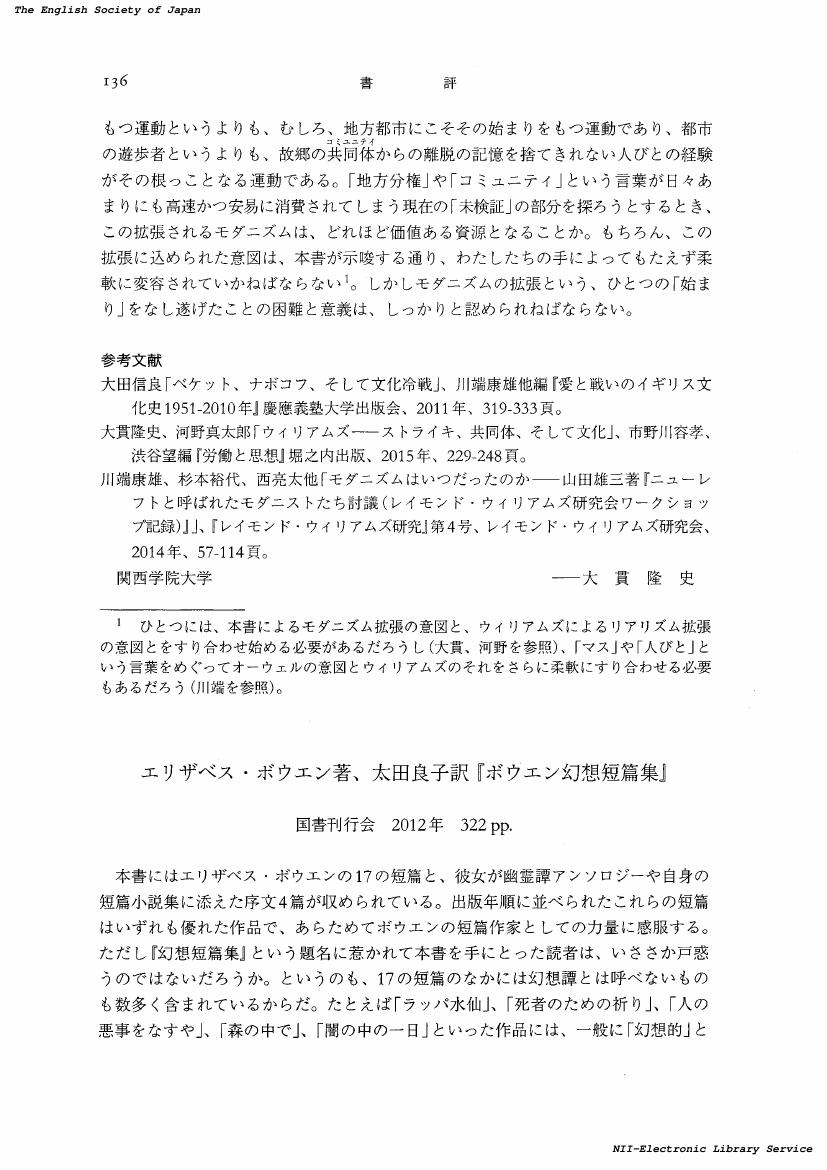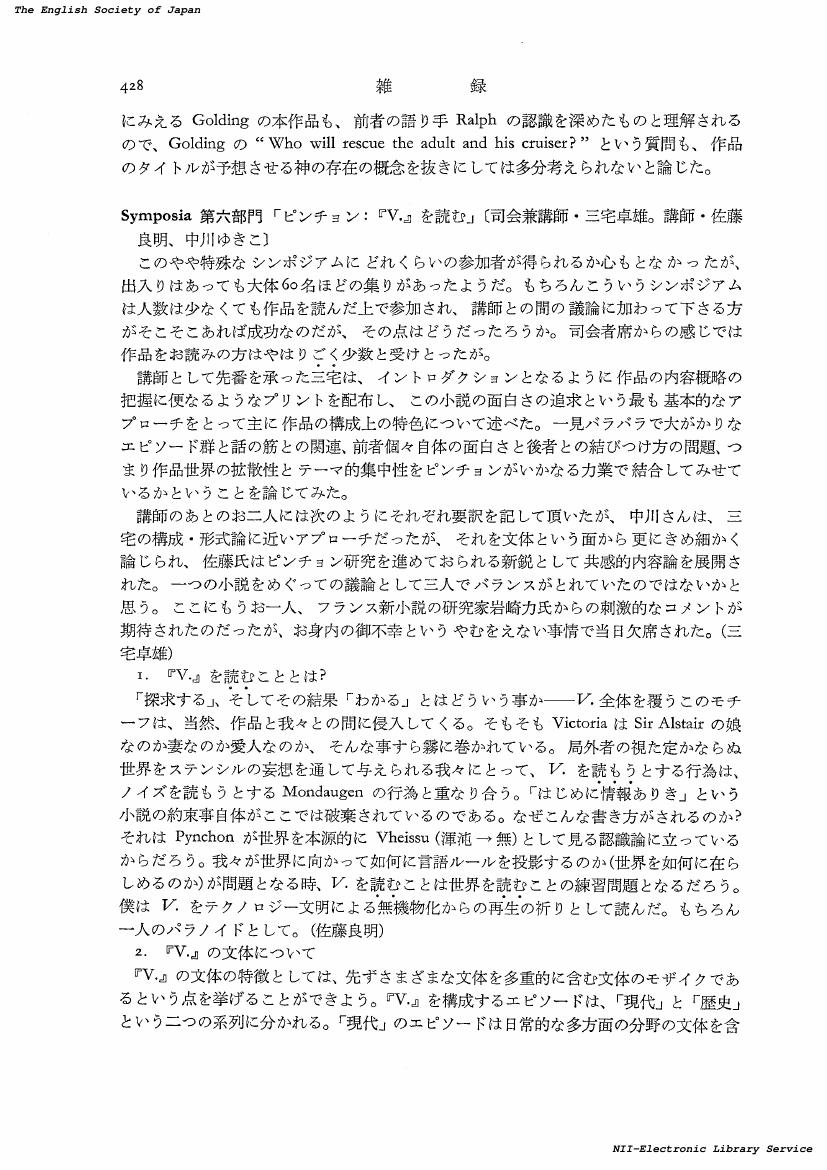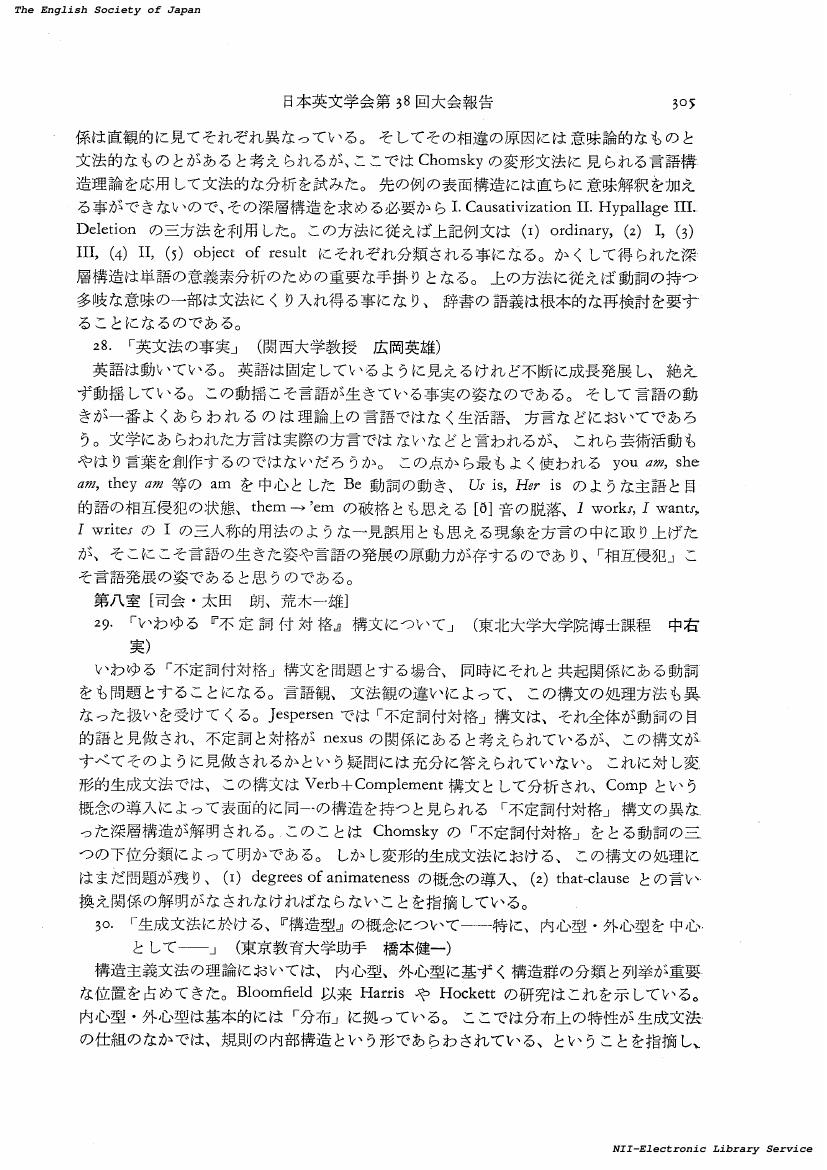- 著者
- 澤村 寅二郎
- 出版者
- 一般財団法人 日本英文学会
- 雑誌
- 英文学研究 (ISSN:00393649)
- 巻号頁・発行日
- vol.23, no.2, pp.205-207, 1943-10-10 (Released:2017-04-10)
- 著者
- 澤村 寅二郎
- 出版者
- 一般財団法人 日本英文学会
- 雑誌
- 英文学研究 (ISSN:00393649)
- 巻号頁・発行日
- vol.23, no.2, pp.205-207, 1943
- 著者
- 菊池 清明
- 出版者
- 一般財団法人 日本英文学会
- 雑誌
- 英文学研究 (ISSN:00393649)
- 巻号頁・発行日
- vol.68, no.2, pp.387-392, 1992
1 0 0 0 OA 栩木伸明著『アイルランド現代詩は語る』, 思潮社, 2001年, 253pp.
- 著者
- 橋本 槙矩
- 出版者
- 一般財団法人 日本英文学会
- 雑誌
- 英文学研究 (ISSN:00393649)
- 巻号頁・発行日
- vol.79, no.1, pp.59-62, 2002-09-30 (Released:2017-04-10)
- 著者
- 村田 辰夫
- 出版者
- 一般財団法人 日本英文学会
- 雑誌
- 英文学研究 (ISSN:00393649)
- 巻号頁・発行日
- vol.52, no.1-2, pp.238-239, 1975-12-01 (Released:2017-04-10)
- 著者
- 池上 忠弘
- 出版者
- 一般財団法人 日本英文学会
- 雑誌
- 英文学研究 (ISSN:00393649)
- 巻号頁・発行日
- vol.55, no.2, pp.349-352, 1978-12-01 (Released:2017-04-10)
1 0 0 0 悲劇的ヴィジョンと〈復讐〉 : エリザベス朝劇における一考察
- 著者
- 笹山 隆
- 出版者
- 一般財団法人 日本英文学会
- 雑誌
- 英文学研究 (ISSN:00393649)
- 巻号頁・発行日
- vol.37, no.2, pp.187-200, 1961
Revenge is so vitally connected with the essence of Elizabethan tragedy that it can never be analyzed away as a mere theatrical device for sensationalism. The present paper is an attempt to see how in the works of each playwright revenge as an actional pattern was affected and modified by his vision of tragedy. The Biblical phrase "Vengeance is mine; I will repay, saith the Lord." was ringing in popular ears; it was nothing less than an abominable sin of pride to anticipate the justice of God. Besides, in all the extant plays of Seneca, whose influence on contemporary tragedy was so potent, the revengers were always depicted as villains. From these circumstances came a line of villain-revenger plays from The Jew of Malta to The Cardinal. God's dictum against human revenge, however, also implied a commitment to divine vengeance. And if the heavenly justice be realized, not by supernatural means alone, but through the agency of man, it would not be impossible that an act of revenge should be justified, though the revenger himself must suffer death as the price of his sin. Thus a lawful revenger was often looked upon at once as a hero and a sinner. This was part of the mystery of the cosmic fate and was closely related to the ambiguity which exists in the core of tragedy. Already in The Spanish Tragedy we find the author confronted with the problem of how to deal with this paradox. By gradually adding the hero-revenger a Machiavellian aspect, Kyd deliberately cancelled the pity aroused for him and simplified the audience's response accordingly. Fletcher in his Valentinian went on this line so far as to disintegrate tragedy through a totally implausible transformation of the protagonist's character. Here as in many other tragedies by Fletcher or Shirley, revenge was linked up with such an ego-centric concept of honour that it had lost its universal ethical meaning. A Woman Killed with Kindness and The Atheist's Tragedy might be considered as potential revenge tragedies in which revenge is transcended either with the spirit of forgiveness or the absolute confidence in divine providence. In The Changeling the author seems to point out incisively that a sinful crime, regardless of the motive, must inevitably germinate a revenge upon the criminal himself. The characters in Women Beware Women and The Revenger's Tragedy inhabit the heart of darkness where various evils latent in human flesh devour each other in complicated plots of revenge and counter-revenge. Webster in his two great tragedies stood above easy moralization; for him revenge was an instrument with which to set off the vain absurdity of being and extol the glory of the human soul that boldly challenges it. Massinger tried to impress somewhat melodramatically the emptiness of self-righteous human justice, whereas Ford utilized revenge only as an aesthetic medium to sustain the pale icy glow of beautified suppressed passions. Chapman in The Revenge of Bussy D'Ambois tackled philosophical problems of revenge, but failed to give unity to his tragedy through the obscurity of his own footing. In Hamlet, when we reflect upon the growing cognizance in the hero of the ubiquitous providence since the incident on the sea, it seems quite reasonable to see in his killing of Claudius not so much a consummation of the revenge which occupies his whole mind in the earlier acts as an instance of divine intervention. Such an interpretation makes way for Hamlet's salvation, and brings him nearer to the hero of Oresteia in his sacrificial role.
1 0 0 0 WILLIAM BLAKE'S TO TIRZAH' : 解釈
- 著者
- 竹森 修
- 出版者
- 一般財団法人 日本英文学会
- 雑誌
- 英文学研究 (ISSN:00393649)
- 巻号頁・発行日
- vol.47, no.2, pp.179-198, 1971
Modern society with its materialist standard of values is now plunging back into the chaos from where it was supposed to have emerged. The materialist civilization has now brought to light its own irrationalities and contradictions, which will prove to be fatal to mankind, if they are left unchecked. From behind its neon-sign brightness a shadow of negative nihilism is looming so overwhelmingly that most of us are in great anxiety about the future of mankind. We are beginning to suspect that this threatening shadow might betray the true character of our civilization, that it might be self-destructive. However, while deeply concerned about the phenomenal aspect of social miseries, we still remain unaware of their spiritual connotations in relation to ourselves, for we take it for granted that they came from the outside. Our spiritual crisis lies in the ever-growing neutralization of human relationships in society. It has its root in our unrestricted self-complacency. Human consciousness is by nature self-complacent, that is, self-centred or self-attached. We are attached to ourselves like a spoilt son, or we spoil ourselves like an indulgent mother. That is what Blake calls 'Maternal Humanity'. It is a spoilt-child mentality which is domineered by a kind of possessive false maternity, false because it is essentially different from true maternity that sets an example of selfless love by its self-devoting, self-annihilating acts. It is a mentality in which paternal severity to oneself remains shadowy, 'silent and invisible', on account of the exclusive mother-child relationship. That is the inherent structure of human consciousness, root of all misery. If there are any authentic possibilities within us, they will be realized only when we expose ourselves constantly to a critique of self-satisfaction. However, the problem is that we have now lost sight of the critique which we saw embodied in religion. As a result, that individual mentality was left to prevail without check so widely that it has come to constitute a kind of climate of opinion in society. It is a spoilt-child society, or we might say a foundling society, for the critical principle of self-satisfaction which is its true parents seems nowhere to be seen. Self-complacency has extended even to the world of ethical and religious values, and is changing it into another hot-house for that mentality. It is most dangerous for humanity, for religion is the only exhaustive critique of self-satisfaction. If religion should cease to be that, it would cease to mean anything for us. And that would lead to mental suicide of mankind. On this point Blake is prophetic. Like other romantic poets, his concern is 'transformation', that is, to transform the cold, inanimate world into a world full of light and life. But he is radically different from them in his severest view of human consciousness, that is, of his own selfhood. He is well aware that the dualism of subject and object created by the discriminative faculty of consciousness implies in itself discrimination against other beings, that our consciousness itself constitutes unauthentic selfhood as self-love. And his greatness lies in his conviction that poetic vision is possible only through self-annihilation, and that 'transformation' is, first of all, the problem of self-transformation, which will ultimately result in the transformation of society. Blake's ontological approach to Reality is really suggestive about the problem of the reinstatement of religion as the one critique of self-satisfaction as well as about the relationship of religion and art.
- 著者
- 北川 依子
- 出版者
- 一般財団法人 日本英文学会
- 雑誌
- 英文学研究 (ISSN:00393649)
- 巻号頁・発行日
- vol.92, pp.136-139, 2015-12-01 (Released:2017-04-10)
- 著者
- 植田 和文
- 出版者
- 一般財団法人 日本英文学会
- 雑誌
- 英文学研究 (ISSN:00393649)
- 巻号頁・発行日
- vol.74, no.2, pp.211-215, 1998-02-10 (Released:2017-04-10)
- 著者
- 荻野 昌利
- 出版者
- 一般財団法人 日本英文学会
- 雑誌
- 英文学研究 (ISSN:00393649)
- 巻号頁・発行日
- vol.78, no.1, pp.48-52, 2001-09-30 (Released:2017-04-10)
- 著者
- 中川 ゆきこ
- 出版者
- 一般財団法人 日本英文学会
- 雑誌
- 英文学研究 (ISSN:00393649)
- 巻号頁・発行日
- vol.56, no.2, pp.428-429, 1979-12-01 (Released:2017-04-10)
- 著者
- 上野 景福
- 出版者
- 一般財団法人 日本英文学会
- 雑誌
- 英文学研究 (ISSN:00393649)
- 巻号頁・発行日
- vol.22, no.4, pp.481-482, 1943-04-18 (Released:2017-04-10)
1 0 0 0 OA 小野寺健著, 『英国文壇史 1890-1920』
- 著者
- 宮田 恭子
- 出版者
- 一般財団法人 日本英文学会
- 雑誌
- 英文学研究 (ISSN:00393649)
- 巻号頁・発行日
- vol.70, no.1, pp.104-107, 1993-09-30 (Released:2017-04-10)
- 著者
- 生地 竹郎
- 出版者
- 一般財団法人 日本英文学会
- 雑誌
- 英文学研究 (ISSN:00393649)
- 巻号頁・発行日
- vol.51, no.1-2, pp.5-21, 1974-11-30 (Released:2017-04-10)
1 0 0 0 OA 29. いわゆる「不定詞付対格」構文について(第八室,日本英文学会第38回大会報告)
- 著者
- 中右 実
- 出版者
- 一般財団法人 日本英文学会
- 雑誌
- 英文学研究 (ISSN:00393649)
- 巻号頁・発行日
- vol.43, no.2, pp.305, 1967-03-30 (Released:2017-04-10)
1 0 0 0 PAULの人生行路 : 何処へ?
- 著者
- 久我 俊二
- 出版者
- 一般財団法人 日本英文学会
- 雑誌
- 英文学研究 (ISSN:00393649)
- 巻号頁・発行日
- vol.58, no.2, pp.169-181, 1981
D. H. LawrenceのSons and Loversは、主人公が成人するにつれての精神発達をたどった所謂Bildungsroman(教養小説)と見ることができる。本論では、川本静子氏の『イギリス教養小説の系譜-「紳士」から「芸術家」へ』で述べられている時代の推移に伴うBildung(人間形成)の目標の変化という問題を基本とし、Sons and Loversの主人公Paul Morelがいかにして目ざすビルドゥングの目標を決めているか、その経緯に見られる特質を指摘して彼の(小説の結末及びその行く末をも含めた)人生全体を考えてみたい。
1 0 0 0 OA 中世ロマンスの台頭と展開(Symposia第九部門,日本英文学会第62回大会報告)
- 著者
- 松井 倫子 新倉 俊一 春田 節子 高宮 利行
- 出版者
- 一般財団法人 日本英文学会
- 雑誌
- 英文学研究 (ISSN:00393649)
- 巻号頁・発行日
- vol.67, no.2, pp.298-299, 1991-01-31 (Released:2017-04-10)
- 著者
- 松田 隆美
- 出版者
- 一般財団法人 日本英文学会
- 雑誌
- 英文学研究 (ISSN:00393649)
- 巻号頁・発行日
- vol.81, pp.252-253, 2005-01-20 (Released:2017-04-10)
1 0 0 0 シェイクスピアのデウスたち : 喜劇的解決の方法について
- 著者
- 正木 恒夫
- 出版者
- 一般財団法人 日本英文学会
- 雑誌
- 英文学研究 (ISSN:00393649)
- 巻号頁・発行日
- vol.62, no.1, pp.3-16, 1985













